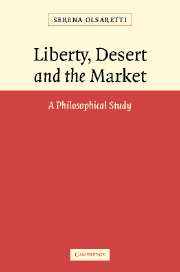Book contents
- Frontmatter
- Contents
- Acknowledgements
- Introduction
- 1 Desert and justifications of the market
- 2 Incentive payments and compensatory desert
- 3 Productive contributions and deserved market rewards
- 4 Liberty and entitlements in the libertarian justification of the free market
- 5 The moralised defence of the free market: a critique
- 6 The free market, force and choice: beyond libertarians and their critics
- Conclusions
- Bibliography
- Index
Introduction
Published online by Cambridge University Press: 22 September 2009
- Frontmatter
- Contents
- Acknowledgements
- Introduction
- 1 Desert and justifications of the market
- 2 Incentive payments and compensatory desert
- 3 Productive contributions and deserved market rewards
- 4 Liberty and entitlements in the libertarian justification of the free market
- 5 The moralised defence of the free market: a critique
- 6 The free market, force and choice: beyond libertarians and their critics
- Conclusions
- Bibliography
- Index
Summary
‘The time when “we are all socialists”’, H. B. Acton said in 1971, ‘is the very time to reconsider the morality of the free market.’ Three decades later, this dictum may, as it were, be reversed. The time when the market is, in its different variants, unanimously taken as a given across the political spectrum, is the very time to subject the morality of the market to critical scrutiny.
The question ‘Should we have a market?’ is now, and for an indefinite time, off the agenda. As is now nearly universally acknowledged, there are overwhelming arguments in favour of market-based economies. One such argument is the informational or epistemic one: the market, as a process whereby property rights are exchanged and decisions by suppliers of goods and services made and adjusted in light of prices, is a discovery procedure that allows valuable information dispersed throughout society to be transmitted. Furthermore, as the incentive argument for the market emphasises, the price mechanism acts as a signalling device for what demand there is for what goods and services, and, by so doing, it offers suppliers an incentive to supply what is in demand by way of prospects of increased profits. Arguments of this sort are amongst the reasons that have lead even those who have been traditionally suspicious about the market's justification, such as socialists, to recast their views in a way that makes room for some role for it.
- Type
- Chapter
- Information
- Liberty, Desert and the MarketA Philosophical Study, pp. 1 - 9Publisher: Cambridge University PressPrint publication year: 2004



